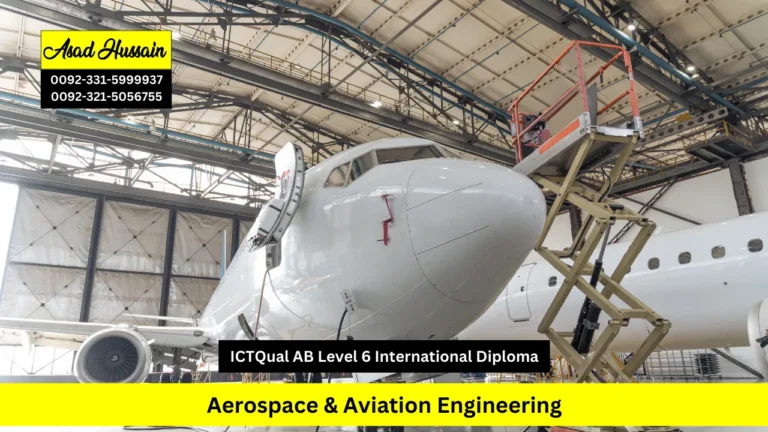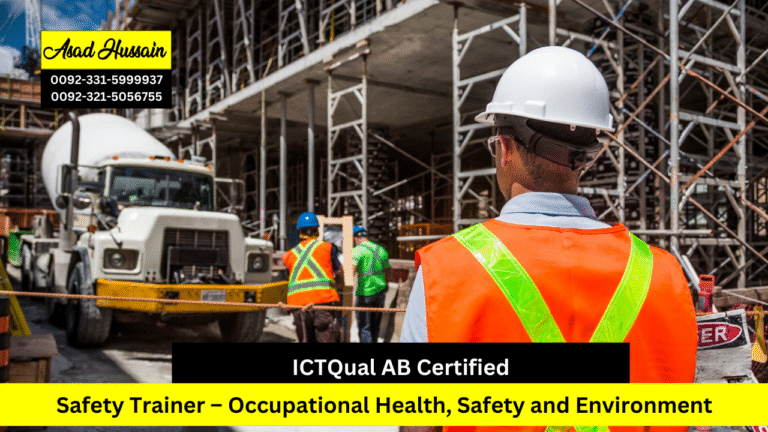The ICTQual AB Level 6 International Diploma in Structural Engineering is a comprehensive and globally recognized program designed to equip learners with advanced knowledge and practical skills in the design, analysis, and management of structural systems. In today’s rapidly evolving construction and infrastructure industries, expertise in structural engineering is critical for ensuring safety, efficiency, and sustainability in building and civil projects. This qualification is highly relevant for both freshers seeking a strong foundation and professionals aiming to advance their careers in engineering and construction management.
ICTQual AB Level 6 International Diploma in Structural Engineering provides learners with a deep understanding of structural principles, materials science, construction techniques, and engineering mechanics. It covers a wide range of topics, including reinforced concrete, steel structures, geotechnical engineering, structural analysis, and advanced design methods. Learners also gain proficiency in the use of modern engineering software and tools essential for modeling, simulation, and structural evaluation.
By completing this course, learners will develop the ability to assess structural integrity, design safe and efficient structures, and apply engineering principles to real-world projects. Practical applications, case studies, and project-based assignments ensure that learners not only gain theoretical knowledge but also hands-on experience essential for professional practice. Additionally, the program emphasizes critical thinking, problem-solving, project management, and compliance with international safety standards, preparing graduates to meet the demands of global engineering projects.
Upon completion, graduates of the ICTQual AB Level 6 International Diploma in Structural Engineering will be well-prepared to pursue careers as structural engineers, design consultants, project managers, or further advanced studies in civil and structural engineering. This qualification provides a strong foundation for contributing to innovative, safe, and sustainable infrastructure development worldwide.
Program Highlights
Study Units
This qualification, the ICTQual AB Level 6 International Diploma in Structural Engineering, consists of 36 mandatory units.
Year 1 – Foundation in Structural Engineering
- Principles of Civil and Structural Engineering
- Engineering Mathematics
- Engineering Mechanics and Materials
- Structural Analysis – Fundamentals
- Engineering Drawing and CAD
- Construction Materials and Technology
- Surveying and Geomatics
- Soil Mechanics and Geotechnics – Basics
- Fluid Mechanics and Hydraulics
- Health, Safety and Environmental Practices in Construction
- Communication and Technical Report Writing
- Introduction to Construction Management
Year 2 – Intermediate Studies in Structural Engineering
- Structural Analysis – Intermediate Applications
- Steel and Concrete Structural Design
- Geotechnical Engineering and Foundation Design
- Applied Hydraulics and Hydrology
- Transportation and Highway Engineering
- Structural Dynamics and Earthquake Engineering – Basics
- Environmental Engineering in Construction
- Advanced Surveying and GIS Applications
- Project Planning and Construction Management
- Construction Economics and Cost Control
- Sustainable Construction Practices
- Applied Research Methods in Engineering
Year 3 – Advanced Studies in Structural Engineering
- Advanced Structural Analysis and Modelling
- Design of High-Rise and Complex Structures
- Bridge Engineering and Design
- Structural Dynamics and Earthquake Engineering – Advanced
- Advanced Geotechnical Engineering
- Construction Project Risk and Quality Management
- Building Information Modelling (BIM) and Digital Engineering
- Smart Materials and Innovative Construction Technologies
- Professional Ethics and Sustainability in Engineering
- Innovation and Entrepreneurship in Engineering
- Infrastructure Development and Urban Planning
- Final Year Major Project (Capstone Project)
The ICTQual AB Level 6 International Diploma in Structural Engineering is designed for learners who wish to advance their knowledge and skills in civil and structural engineering. To ensure learners are adequately prepared for the rigorous curriculum, the following entry requirements apply:
Age Requirements
- Applicants must be at least 18 years old at the time of enrolment.
- Mature learners with relevant professional experience may also be considered, regardless of age.
Educational Requirements
- A minimum of a Level 5 Diploma or equivalent in Civil Engineering, Construction, or related fields.
- High school graduates with strong mathematics and physics backgrounds may be eligible through an assessment process.
Professional Experience
- For experienced professionals, at least 6 years of verifiable work experience in structural engineering, construction, or related sectors may be required.
- Experience-based admission allows candidates to demonstrate competency through prior work achievements.
English Language Proficiency
- Learners must have a good command of English, both written and spoken.
- International candidates may provide IELTS (minimum 5.5) or equivalent certification to meet language requirements.
Meeting these entry requirements ensures that learners possess the foundational knowledge, skills, and experience necessary to fully engage with the ICTQual AB Level 6 International Diploma in Structural Engineering. By adhering to these prerequisites, candidates are better equipped to understand complex engineering concepts, apply advanced structural analysis techniques, and manage construction projects effectively. This preparation enables learners to maximize the benefits of the program, enhance their technical competencies, and develop the professional expertise required to advance in structural and civil engineering careers.
The ICTQual AB Level 6 International Diploma in Structural Engineering equips learners with advanced knowledge, technical proficiency, and practical skills required for a successful career in civil and structural engineering. Upon completion, learners will be capable of designing, analyzing, and managing complex engineering projects while adhering to safety, sustainability, and professional standards.
Year 1 – Foundation in Structural Engineering
Principles of Civil and Structural Engineering
- Understand fundamental concepts in civil and structural engineering.
- Apply engineering principles to simple structural systems.
- Recognize industry standards and best practices.
Engineering Mathematics
- Apply advanced mathematical techniques to engineering problems.
- Solve real-world calculations for structural analysis and design.
- Use statistical and algebraic methods in engineering decision-making.
Engineering Mechanics and Materials
- Analyze forces, moments, and stress in structures.
- Evaluate material properties for construction suitability.
- Apply mechanics principles to basic engineering designs.
Structural Analysis – Fundamentals
- Examine loads and reactions in basic structures.
- Apply analytical methods to simple beams, frames, and trusses.
- Assess structural stability and safety requirements.
Engineering Drawing and CAD
- Produce accurate engineering drawings and technical plans.
- Use CAD software for design and visualization.
- Interpret construction drawings and specifications effectively.
Construction Materials and Technology
- Identify and select appropriate construction materials.
- Understand material behavior under different environmental conditions.
- Apply technology in material testing and usage.
Surveying and Geomatics
- Conduct basic land and structural surveys.
- Use geomatics techniques for site assessment.
- Interpret survey data for project planning.
Soil Mechanics and Geotechnics – Basics
- Analyze soil properties and behavior.
- Apply basic foundation design principles.
- Assess ground conditions for construction feasibility.
Fluid Mechanics and Hydraulics
- Understand flow behavior in engineering systems.
- Solve problems related to water distribution and hydraulics.
- Apply fluid principles to construction projects.
Health, Safety and Environmental Practices in Construction
- Identify workplace hazards and safety protocols.
- Implement environmental best practices.
- Comply with national and international safety standards.
Communication and Technical Report Writing
- Prepare clear and professional technical reports.
- Present engineering data effectively.
- Enhance written and verbal communication skills.
Introduction to Construction Management
- Understand project management fundamentals.
- Plan and schedule small-scale projects.
- Coordinate resources and personnel efficiently.
Year 2 – Intermediate Studies in Structural Engineering
Structural Analysis – Intermediate Applications
- Analyze indeterminate structures using advanced methods.
- Apply software tools for structural modeling.
- Evaluate load effects and structural response.
Steel and Concrete Structural Design
- Design structural components using steel and concrete.
- Apply design codes and standards effectively.
- Assess durability and load-bearing capacity.
Geotechnical Engineering and Foundation Design
- Design shallow and deep foundations.
- Assess soil-structure interactions.
- Evaluate geotechnical risks and mitigation methods.
Applied Hydraulics and Hydrology
- Analyze water flow in natural and engineered systems.
- Apply hydrological principles to infrastructure design.
- Manage flood and drainage systems effectively.
Transportation and Highway Engineering
- Plan and design transportation networks.
- Apply highway engineering principles.
- Assess traffic flow and safety considerations.
Structural Dynamics and Earthquake Engineering – Basics
- Understand basic dynamic behavior of structures.
- Apply earthquake-resistant design principles.
- Evaluate seismic effects on building safety.
Environmental Engineering in Construction
- Implement sustainable construction practices.
- Assess environmental impacts of projects.
- Apply environmental management standards.
Advanced Surveying and GIS Applications
- Utilize GIS for spatial analysis in engineering.
- Conduct advanced land and structural surveys.
- Integrate survey data into project planning.
Project Planning and Construction Management
- Develop detailed project schedules and plans.
- Manage budgets, resources, and timelines.
- Apply risk assessment in project execution.
Construction Economics and Cost Control
- Evaluate project costs and financial feasibility.
- Implement cost control and budgeting techniques.
- Analyze economic impact of engineering decisions.
Sustainable Construction Practices
- Integrate green technologies in structural projects.
- Apply lifecycle assessment for sustainable design.
- Promote energy efficiency and eco-friendly materials.
Applied Research Methods in Engineering
- Conduct research using engineering methodologies.
- Analyze data and draw actionable conclusions.
- Present research findings professionally.
Year 3 – Advanced Studies in Structural Engineering
Advanced Structural Analysis and Modelling
- Model complex structures using computational methods.
- Evaluate structural behavior under multiple load conditions.
- Apply advanced analysis for optimization.
Design of High-Rise and Complex Structures
- Design multi-story buildings using modern techniques.
- Assess structural stability under dynamic conditions.
- Apply safety and compliance standards.
Bridge Engineering and Design
- Design bridge components and systems.
- Analyze load distribution and structural performance.
- Apply relevant codes and standards.
Structural Dynamics and Earthquake Engineering – Advanced
- Design structures for high seismic risk areas.
- Apply advanced dynamic analysis techniques.
- Assess structural resilience under extreme events.
Advanced Geotechnical Engineering
- Design deep foundations, retaining structures, and slopes.
- Evaluate soil-structure interactions using advanced methods.
- Apply geotechnical risk mitigation strategies.
Construction Project Risk and Quality Management
- Identify project risks and implement mitigation strategies.
- Ensure quality control throughout construction.
- Apply best practices in risk and quality management.
Building Information Modelling (BIM) and Digital Engineering
- Utilize BIM software for project visualization and coordination.
- Integrate digital tools in design and construction processes.
- Collaborate using digital engineering platforms.
Smart Materials and Innovative Construction Technologies
- Evaluate innovative materials and their applications.
- Integrate smart technologies in construction.
- Assess performance and sustainability of new materials.
Professional Ethics and Sustainability in Engineering
- Apply ethical principles in engineering practice.
- Promote sustainable and responsible construction.
- Comply with industry standards and regulations.
Innovation and Entrepreneurship in Engineering
- Develop innovative engineering solutions.
- Apply entrepreneurial thinking in project planning.
- Manage engineering ventures and startups.
Infrastructure Development and Urban Planning
- Plan and design urban infrastructure projects.
- Evaluate socio-economic and environmental impacts.
- Integrate sustainable urban development principles.
Final Year Major Project (Capstone Project)
- Undertake a complex, real-world engineering project.
- Demonstrate application of knowledge and skills across units.
- Produce a professional report and presentation of outcomes.
This comprehensive set of learning outcomes ensures that graduates of the ICTQual AB Level 6 International Diploma in Structural Engineering are fully prepared to excel in professional practice, research, and leadership roles within civil and structural engineering industries worldwide.
The ideal learners for this course are those who are motivated to advance their knowledge and skills in structural and civil engineering, and who aim to pursue professional growth in the construction and infrastructure sectors.
Advanced Competencies
- Learners seeking to develop advanced skills in structural analysis, design, and construction management.
- Individuals aiming to enhance problem-solving and technical decision-making in engineering projects.
Professional Development
- Engineering professionals looking to move into senior or specialized roles in civil and structural projects.
- Graduates from civil, structural, or construction-related disciplines pursuing a globally recognized qualification.
Innovation and Sustainability
- Learners interested in sustainable construction practices, innovative engineering technologies, and modern infrastructure development.
- Individuals aiming to implement modern techniques and technologies in real-world engineering projects.
Career Aspirations
- Aspiring professionals who want to manage complex engineering projects or lead multidisciplinary teams.
- Learners seeking opportunities in consultancy, project management, or infrastructure development.
Completing this course equips learners with a comprehensive understanding of structural engineering principles, advanced analytical techniques, and practical problem-solving skills essential for modern engineering projects. Learners gain hands-on experience in designing, evaluating, and managing complex structures, while also developing expertise in sustainable construction practices, innovative materials, and cutting-edge engineering technologies.
We are an approved centre of ICTQual AB, and learners must enrol with us to pursue this internationally recognized qualification.
Route 1 – Experienced Professionals
- Designed for individuals with a minimum of 6 years verifiable professional experience in structural engineering, civil engineering, or related construction fields.
- Candidates can gain direct recognition for their practical experience and demonstrate competency through a professional portfolio.
- No requirement to complete all 36 assignments, as prior experience is assessed against course outcomes.
- Learners will receive guidance and support from our centre to ensure successful certification based on experience.
Route 2 – Fresh Candidates
- Suitable for learners without extensive professional experience or recent graduates.
- Learners are required to complete all 36 mandatory assignments across the three-year program.
- Provides structured learning, practical exercises, and assessments to develop comprehensive skills and knowledge in structural engineering.
- Full support and mentoring are provided throughout the course to ensure competency and successful certification.
Both routes lead to the internationally recognized ICTQual AB Level 6 International Diploma in Structural Engineering, enabling graduates to advance their careers, manage complex engineering projects, and pursue leadership roles in the civil and structural engineering sectors.







